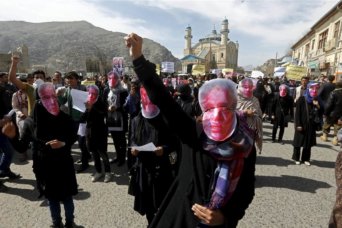- About
- Topics
- Story
- In-Depth
- Picks
- Opinion
- News
- Donate
- Signup for our newsletterOur Editors' Best Picks.Send
Read, Debate: Engage.
Four men convicted of one of Afghanistan's grisliest murders in years have been spared the death penalty. But the questions remains: will they face justice at all?
In March a female student in her 20s, Farkhunda Malikzada, was murdered by mob outside a mosque in Kabul. They accused her of having burned a Quran.
According to Human Rights Watch, "The mostly young men beat her, ran her over with a car, and then lit her on fire. Police present at the scene did not act effectively to protect her. We know this because the murder was captured over and over again on cellphone video that was posted on Facebook for all to see."
The trial, which was televised (unusual in Afghanistan), concluded with the four men being sentenced to death, while another eight received 16 years' imprisonment. 11 police officers received one year in prison each, while another 18 attackers and eight police officers were acquitted.
The sheer number of people involved in Farkhunda's murder speaks volumes about the acceptance of violence against women in Afghanistan - particularly when you see just how many police officers were present who, rather than trying to stop the violence, ended up being convicted themselves.
Protests across Afghanistan and abroad have called for #JusticeForFarkhunda, and President Ghani was forced to answer the public outcry, although he has done so with contradictory statements.
While the trial was very public (possibly an attempt to answer the public's demands), the four men's appeal was so secretive that Farkhunda's family only found out after their sentences had been changed to 10 or 20 years in prison.
While we do not support the death penalty, we agree with Human Rights Watch that real #JusticeForFarkhunda would mean policy changes in the country known as the worst place to be born a woman. The make some good suggestions:
"The president could order the police to reopen the investigation and search for remaining attackers who can be seen on the video but have not yet been arrested or charged. He could order disciplinary sanctions, including firing, against all police officers found to have engaged in misconduct in relation to the March 19 events – even if the misconduct did not rise to the level of criminal behavior."
"Even more importantly, Ghani could advance systemic reforms that would honor the memory of Farkhunda by helping to prevent such horrific crimes from happening again. He could develop a tough mechanism within the Afghanistan National Police to hold officers accountable for their behavior; none currently exists. He could take real steps to recruit and retain and provide decent working conditions for female police officers – something both he and his predecessor, Hamid Karzai, have failed to do."
"Most importantly, he could bolster enforcement of Afghanistan’s 2009 Law on the Elimination of Violence Against Women, which promised important reforms, but has been plagued by weak enforcement, including by Ghani’s administration."
"Nothing will bring Farkhunda back, but there’s much more Ghani should be doing to bring #JusticeForFarkhunda."
